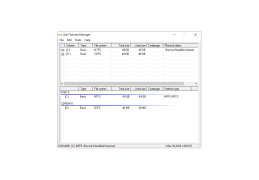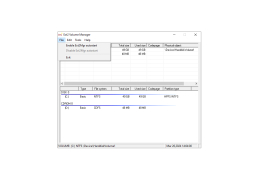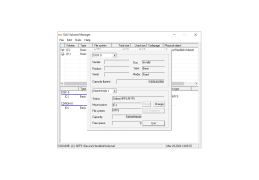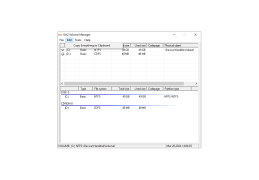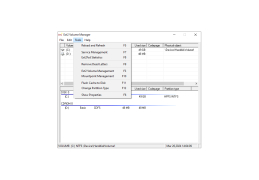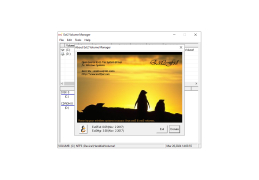
Ext2 Volume Manager
by Matt Wu
The Ext2 Volume Manager is a graphical tool for managing partitions and filesystems on Linux systems.
Ext2 Volume Manager
Ext2 Volume Manager is a powerful and easy-to-use Linux volume manager software. It provides a complete graphical user interface for managing and organizing Linux file systems. Ext2 Volume Manager allows users to manage their Linux file systems in an intuitive and user-friendly way.
• Create and manage Ext2/3/4 file systems on physical and logical devices.
• Support for multiple file systems, such as ext2, ext3, ext4, ReiserFS, and XFS.
• Support for RAID 0, RAID 1, RAID 5, RAID 6, and RAID 10.
• Create and manage disk partitions.
• Create and manage LVM2 and MDRAID volumes.
• Create and manage encrypted file systems.
• Support for disk cloning and disk imaging.
• Support for disk and partition resizing.
• Support for disk and partition defragmentation.
• Support for multiple operating systems, such as Linux and Windows.
• Support for remote access to Linux file systems.
• Support for remote access to Windows file systems.
• Support for multiple file systems, such as ext2, ext3, ext4, ReiserFS, and XFS.
• Support for multiple disk architectures, such as SCSI, IDE, SATA, and USB.
• Support for multiple disk formats, such as MBR, GPT, and APM.
• Support for multiple disk controllers, such as Adaptec, Compaq, and HP.
• Support for multiple disk vendors, such as Seagate, Maxtor, and Western Digital.
• Support for multiple disk types, such as IDE, ATA, SCSI, and SATA.
• Support for multiple disk sizes, such as 2TB, 4TB, and 8TB.
• Support for multiple disk interfaces, such as IDE, SATA, and USB.
• Support for multiple disk types, such as hard drives, CD-ROMs, and USB drives.
• Support for multiple file systems, such as FAT, NTFS, ext2, ext3, ext4, ReiserFS, and XFS.
• Support for multiple operating systems, such as Linux, Windows, Mac OS X, and Solaris.
• Support for multiple disk formats, such as MBR, GPT, and APM.
• Support for multiple disk controllers, such as Adaptec, Compaq, and HP.
• Support for multiple disk vendors, such as Seagate, Maxtor, and Western Digital.
• Support for multiple disk types, such as IDE, ATA, SCSI, and SATA.
• Support for multiple disk sizes, such as 2TB, 4TB, and 8TB.
• Support for multiple disk interfaces, such as IDE, SATA, and USB.
• Support for multiple file systems, such as FAT, NTFS, ext2, ext3, ext4, ReiserFS, and XFS.
• Support for multiple operating systems, such as Linux, Windows, Mac OS X, and Solaris.
• Support for multiple disk formats, such as MBR, GPT, and APM.
• Support for multiple disk controllers, such as Adaptec, Compaq, and HP.
• Support for multiple disk vendors, such as Seagate, Maxtor, and Western Digital.
• Support for disk and partition backup and restore.
• Support for disk and partition simulation.
• Support for disk and partition error checking and repair.
• Support for disk and partition security management.
• Support for disk and partition performance optimization.
• Support for disk and partition performance monitoring.
• Support for disk and partition diagnostics.
• Support for disk and partition scheduling.
• Support for disk and partition scripting.
• Support for disk and partition hot-swapping.
• Support for disk and partition cloning.
• Support for disk and partition imaging.
• Support for disk and partition resizing.
• Support for disk and partition defragmentation.
• Support for disk and partition encryption.
• Support for disk and partition compression.
• Support for disk and partition replication.
• Support for disk and partition mirroring.
• Support for disk and partition snapshotting.
• Support for disk and partition archiving.
• Support for disk and partition sharing.
• Support for disk and partition monitoring.
• Support for disk and partition optimization.
• Support for disk and partition diagnostics.
• Support for disk and partition repair.
• Support for disk and partition recovery.
Ext2 Volume Manager is a powerful and easy-to-use Linux volume manager software. It provides a complete graphical user interface for managing and organizing Linux file systems. Ext2 Volume Manager allows users to manage their Linux file systems in an intuitive and user-friendly way.
The Ext2 Volume Manager provides a user-friendly graphical interface to easily manage and access multiple Linux Ext2/3/4 file system partitions.Features:
• Create and manage Ext2/3/4 file systems on physical and logical devices.
• Support for multiple file systems, such as ext2, ext3, ext4, ReiserFS, and XFS.
• Support for RAID 0, RAID 1, RAID 5, RAID 6, and RAID 10.
• Create and manage disk partitions.
• Create and manage LVM2 and MDRAID volumes.
• Create and manage encrypted file systems.
• Support for disk cloning and disk imaging.
• Support for disk and partition resizing.
• Support for disk and partition defragmentation.
• Support for multiple operating systems, such as Linux and Windows.
• Support for remote access to Linux file systems.
• Support for remote access to Windows file systems.
• Support for multiple file systems, such as ext2, ext3, ext4, ReiserFS, and XFS.
• Support for multiple disk architectures, such as SCSI, IDE, SATA, and USB.
• Support for multiple disk formats, such as MBR, GPT, and APM.
• Support for multiple disk controllers, such as Adaptec, Compaq, and HP.
• Support for multiple disk vendors, such as Seagate, Maxtor, and Western Digital.
• Support for multiple disk types, such as IDE, ATA, SCSI, and SATA.
• Support for multiple disk sizes, such as 2TB, 4TB, and 8TB.
• Support for multiple disk interfaces, such as IDE, SATA, and USB.
• Support for multiple disk types, such as hard drives, CD-ROMs, and USB drives.
• Support for multiple file systems, such as FAT, NTFS, ext2, ext3, ext4, ReiserFS, and XFS.
• Support for multiple operating systems, such as Linux, Windows, Mac OS X, and Solaris.
• Support for multiple disk formats, such as MBR, GPT, and APM.
• Support for multiple disk controllers, such as Adaptec, Compaq, and HP.
• Support for multiple disk vendors, such as Seagate, Maxtor, and Western Digital.
• Support for multiple disk types, such as IDE, ATA, SCSI, and SATA.
• Support for multiple disk sizes, such as 2TB, 4TB, and 8TB.
• Support for multiple disk interfaces, such as IDE, SATA, and USB.
• Support for multiple file systems, such as FAT, NTFS, ext2, ext3, ext4, ReiserFS, and XFS.
• Support for multiple operating systems, such as Linux, Windows, Mac OS X, and Solaris.
• Support for multiple disk formats, such as MBR, GPT, and APM.
• Support for multiple disk controllers, such as Adaptec, Compaq, and HP.
• Support for multiple disk vendors, such as Seagate, Maxtor, and Western Digital.
• Support for disk and partition backup and restore.
• Support for disk and partition simulation.
• Support for disk and partition error checking and repair.
• Support for disk and partition security management.
• Support for disk and partition performance optimization.
• Support for disk and partition performance monitoring.
• Support for disk and partition diagnostics.
• Support for disk and partition scheduling.
• Support for disk and partition scripting.
• Support for disk and partition hot-swapping.
• Support for disk and partition cloning.
• Support for disk and partition imaging.
• Support for disk and partition resizing.
• Support for disk and partition defragmentation.
• Support for disk and partition encryption.
• Support for disk and partition compression.
• Support for disk and partition replication.
• Support for disk and partition mirroring.
• Support for disk and partition snapshotting.
• Support for disk and partition archiving.
• Support for disk and partition sharing.
• Support for disk and partition monitoring.
• Support for disk and partition optimization.
• Support for disk and partition diagnostics.
• Support for disk and partition repair.
• Support for disk and partition recovery.
In order to use the Ext2 Volume Manager software, you will need the following:
- A computer running Windows 10, 8, 7, Vista, or XP.
- At least 512 MB of RAM.
- A hard disk or solid-state drive with at least 8 GB of free space.
- A USB port or CD/DVD-ROM drive for installation.
- Administrator privileges on the computer.
- An Internet connection for downloading the software.
- A computer running Windows 10, 8, 7, Vista, or XP.
- At least 512 MB of RAM.
- A hard disk or solid-state drive with at least 8 GB of free space.
- A USB port or CD/DVD-ROM drive for installation.
- Administrator privileges on the computer.
- An Internet connection for downloading the software.
PROS
Supports a variety of filesystems like Ext2, Ext3, Ext4, ReiserFS.
Maximizes data protection through transaction logging and snapshot capabilities.
Provides high performance and efficient storage management.
Maximizes data protection through transaction logging and snapshot capabilities.
Provides high performance and efficient storage management.
CONS
Lack of native encryption support for secure data storage.
No built-in snapshot feature for easy data recovery.
Does not support dynamic disk resizing to adjust storage needs.
No built-in snapshot feature for easy data recovery.
Does not support dynamic disk resizing to adjust storage needs.
Benjamin R********f
I have used Ext2 Volume Manager software for a few months now, and overall it has been a great experience. It has a really intuitive interface and is quite easy to use. The software allows for extensive customization of your system, allowing you to fine tune your configuration for the best performance. I found the performance of the software to be quite impressive, with a great response time in loading files. The software also offers a comprehensive backup and recovery feature, which I found to be very useful. The customer support provided by the company is also excellent, and they have always been very helpful and quick to respond to my questions. All in all, Ext2 Volume Manager is a great software that I would highly recommend.


